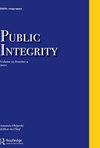Impact of Institutional Performance and Integrity on Public Trust during COVID-19: A Retrospective Examination in the Arabic Context
IF 1.1
Q3 PUBLIC ADMINISTRATION
引用次数: 0
Abstract
AbstractPurpose This study examines trust in public sector institutions during the coronavirus (COVID-19) pandemic and the impact factors.Methodology A survey was administered to a convenience sample of 1,372 local and expatriate residents in the United Arab Emirates during 2022–2023. Bivariate and multiple regression analyses were utilized.Findings There was a high level of general public trust among respondents (mean = 4.11), with the highest trust in the police (mean = 4.21) followed by trust in the information disseminated by the government (mean = 4.06) and in the performance of public sector institutions (mean = 3.89). On the bivariate and multivariate levels, demographic variables had an insignificant impact on public trust. General trust was significantly correlated with institutional performance (β = 0.417), institutional integrity (β = 0.397), perceived gains (β = 0.378), and government-disseminated information (β = 0.374).Implications Public trust is a complex reality linked to numerous organizational and nonorganizational factors. Improving public trust requires enhancing ethical conduct—crucial for maintaining trust—as well as good governance practices and leadership behavior.Limitations The sample size and quantitative focus might have limited the generalizability of the findings. In the future, researchers should use in-depth interviews or mixed methodologies.Keywords: Trustpublic sector COVID-19UAEmultiple linear regression AcknowledgmentsThanks are extended to the editorial team and the reviewers.Disclosure statementNo potential conflict of interest was reported by the author(s).Additional informationFundingThis work was supported by the United Arab Emirates University under the UAEU Program for Advanced Research (UPAR-2280-G00004171) and under United Arab Emirates University Summer Undergraduate Research Experiences (SurePlus-2115-G00003924).2019冠状病毒病期间机构绩效和诚信对公众信任的影响:阿拉伯背景下的回顾性研究
摘要目的探讨新冠肺炎疫情期间公众对公共部门机构的信任及其影响因素。在2022-2023年期间,对阿拉伯联合酋长国的1372名当地和外籍居民进行了一项调查。采用双变量和多元回归分析。调查结果显示,受访者对公众的总体信任度较高(平均= 4.11),其中对警察的信任度最高(平均= 4.21),其次是对政府发布的信息的信任度(平均= 4.06)和对公共部门机构绩效的信任度(平均= 3.89)。在双变量和多变量水平上,人口统计变量对公众信任的影响不显著。一般信任与机构绩效(β = 0.417)、机构诚信(β = 0.397)、感知收益(β = 0.378)和政府传播信息(β = 0.374)显著相关。公众信任是一个复杂的现实,与许多组织和非组织因素有关。提高公众信任需要加强道德行为——这对维持信任至关重要——以及良好的治理实践和领导行为。样本量和定量焦点可能限制了研究结果的普遍性。在未来,研究人员应该使用深度访谈或混合方法。关键词:信任公共部门新冠肺炎多元线性回归感谢编辑团队和审稿人。披露声明作者未报告潜在的利益冲突。本研究由阿联酋大学UAEU高级研究项目(UPAR-2280-G00004171)和阿联酋大学暑期本科生研究经历项目(suplus -2115- g00003924)资助。
本文章由计算机程序翻译,如有差异,请以英文原文为准。
求助全文
约1分钟内获得全文
求助全文

 求助内容:
求助内容: 应助结果提醒方式:
应助结果提醒方式:


